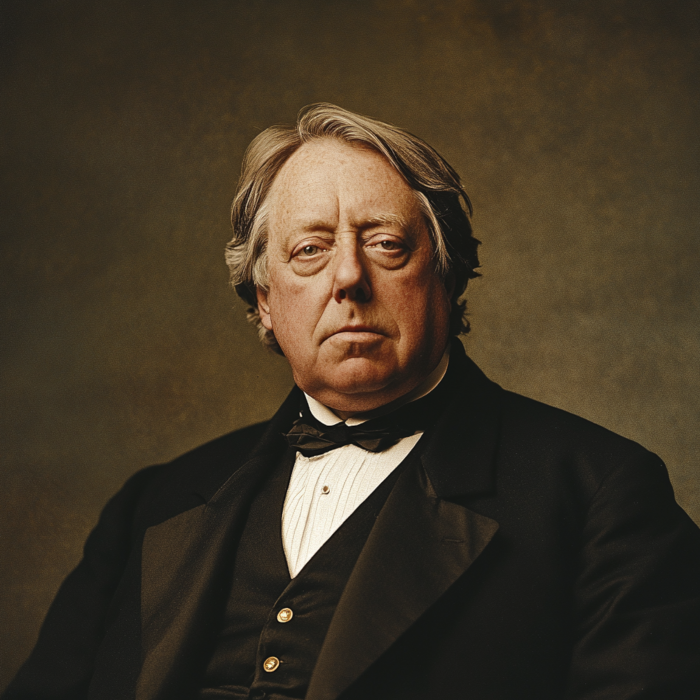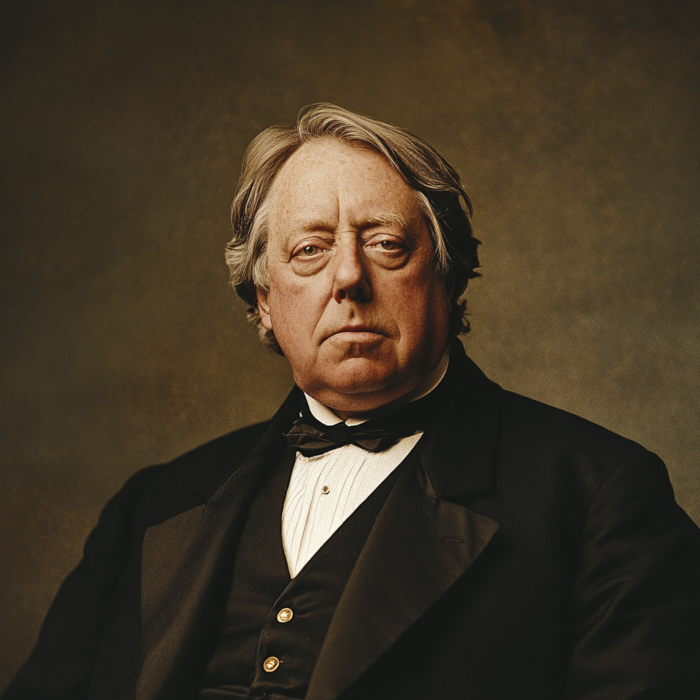


Henry Ward Beecher (1813–1887) was a prominent American Congregationalist clergyman, social reformer, and speaker, best known for his advocacy of abolitionism, women's suffrage, and temperance. He was one of the most influential and popular preachers of the 19th century, known for his charismatic oratory and his ability to address social issues from the pulpit. Beecher was also the brother of Harriet Beecher Stowe, the author of Uncle Tom's Cabin, a novel that had a significant impact on the anti-slavery movement in the United States.
Birth and Family Background: Henry Ward Beecher was born on June 24, 1813, in Litchfield, Connecticut, into a prominent New England family. His father, Lyman Beecher, was a well-known Calvinist preacher and theologian, and his mother, Roxana Foote Beecher, came from a distinguished family. Henry was the eighth of 13 children, many of whom became influential figures in American religious and social life. His sister, Harriet Beecher Stowe, became famous for her anti-slavery novel Uncle Tom's Cabin.
Education: Beecher attended several schools, including Boston Latin School, and later enrolled at Amherst College in Massachusetts, where he graduated in 1834. He went on to study theology at Lane Theological Seminary in Cincinnati, Ohio, where his father was the president. Beecher was ordained as a minister in 1837.
Early Ministry: Beecher began his ministry in Lawrenceburg, Indiana, before moving to Indianapolis in 1839, where he served as the pastor of the Second Presbyterian Church. During this time, he developed a reputation as a powerful and eloquent preacher. His sermons often addressed social issues, reflecting his deep concern for the moral and spiritual welfare of his congregation.
Plymouth Church, Brooklyn: In 1847, Beecher was called to serve as the pastor of Plymouth Church in Brooklyn, New York. It was here that he gained national prominence. Plymouth Church, under Beecher's leadership, became one of the most famous and influential churches in the United States. His dynamic preaching style, which combined humor, emotion, and moral conviction, attracted large crowds, and his sermons were widely published and read.
Abolitionism: Beecher was a fervent abolitionist, using his pulpit to advocate for the end of slavery. He was known for his "practical Christianity," which emphasized the application of Christian principles to social reform. Beecher supported the Underground Railroad, a network that helped enslaved people escape to freedom, and he raised money to buy the freedom of enslaved individuals. His church became a center of anti-slavery activity, and he often preached against the institution of slavery, using his sermons to rally support for the abolitionist cause.
Beecher's Bibles: During the 1850s, Beecher became associated with the term "Beecher's Bibles," which referred to the Sharps rifles he helped send to anti-slavery settlers in Kansas. These settlers were engaged in a violent conflict with pro-slavery forces over whether Kansas would enter the Union as a free or slave state. The rifles, shipped in crates marked "Bibles," symbolized Beecher's belief that armed resistance was sometimes necessary to combat the evil of slavery.
Women's Rights: Beecher was also an early advocate for women's rights and suffrage. He believed in the equality of men and women and supported the idea that women should have the right to vote, receive an education, and participate fully in public life. His progressive views on gender roles were reflected in his sermons and public speeches.
Temperance Movement: Beecher was an active supporter of the temperance movement, which sought to reduce or eliminate the consumption of alcohol. He viewed alcohol as a major social evil that contributed to poverty, crime, and moral decay. His sermons frequently addressed the dangers of alcohol and encouraged his congregation to support temperance initiatives.
The Tilton Scandal: Despite his many achievements, Beecher's later years were overshadowed by a scandal that damaged his reputation. In 1872, Beecher was accused of having an affair with Elizabeth Tilton, the wife of his friend and former protégé, Theodore Tilton. The allegations led to a sensational trial that captivated the nation. The trial, which took place in 1875, ended in a hung jury, leaving the matter unresolved. While Beecher denied the allegations and retained the support of many of his followers, the scandal tarnished his legacy and exposed divisions within his congregation and the wider community.
Continued Influence: Despite the scandal, Beecher continued to preach and remained a prominent public figure until his death. He continued to advocate for social reform and was involved in various charitable and philanthropic endeavors. His influence extended beyond the pulpit, as he wrote numerous books and articles on theology, social issues, and moral philosophy.
Death: Henry Ward Beecher died on March 8, 1887, at the age of 73, in Brooklyn, New York. His death was widely mourned, and he was remembered as one of the most influential religious leaders of his time. His funeral was attended by thousands of people, reflecting the widespread impact of his ministry.
Legacy: Beecher's legacy is complex and multifaceted. He is remembered as a passionate advocate for abolition, women's rights, and social justice. His charismatic preaching and commitment to using religion as a force for social change had a lasting impact on American religious and cultural life. However, the scandal that marred his later years remains a significant part of his story, illustrating the challenges faced by public figures who are held to high moral standards.
Influence on American Religion: Beecher's approach to religion, which emphasized love, forgiveness, and social action, helped shape the development of liberal Protestantism in the United States. His willingness to engage with contemporary social issues and his belief in the power of the church to effect change continue to influence religious leaders and social reformers.
Henry Ward Beecher was a towering figure in 19th-century America, known for his oratory, his advocacy for social justice, and his efforts to apply Christian principles to the challenges of his time. Despite the controversies that surrounded him, his contributions to the abolitionist movement and his progressive views on social issues have left an enduring mark on American history.

We use cookies
We use cookies and other tracking technologies to improve your browsing experience on our website, to show you personalized content and targeted ads, to analyze our website traffic, and to understand where our visitors are coming from. Privacy Policy.